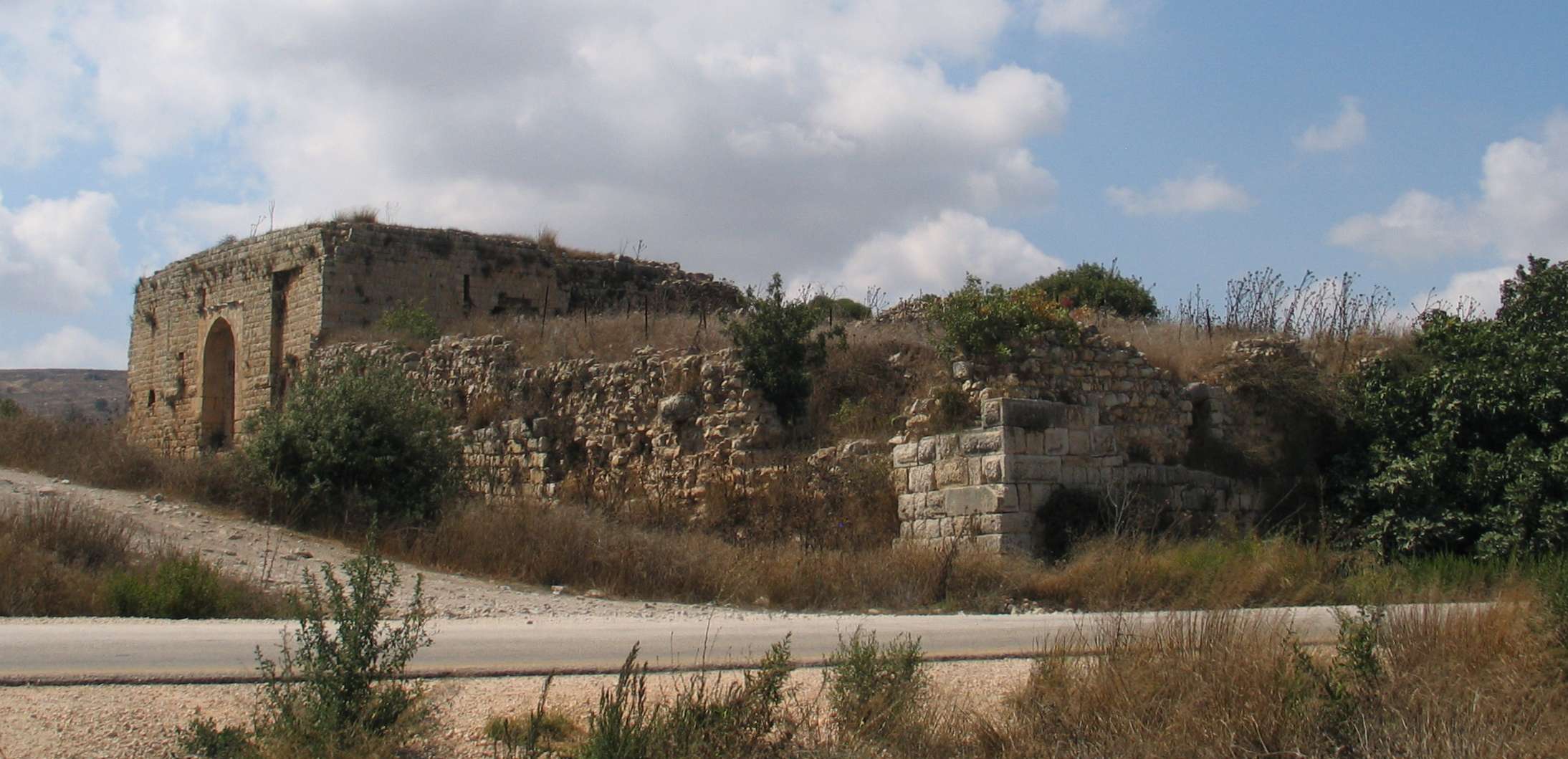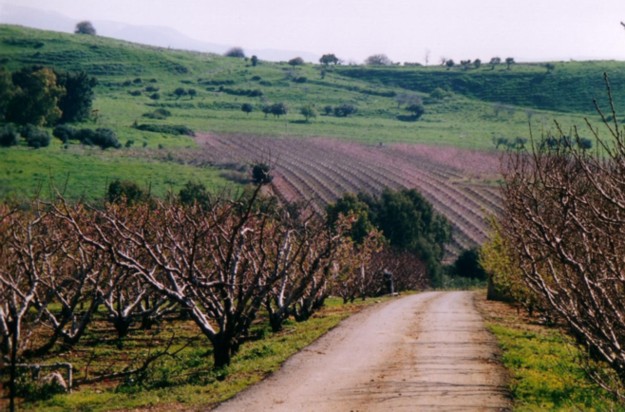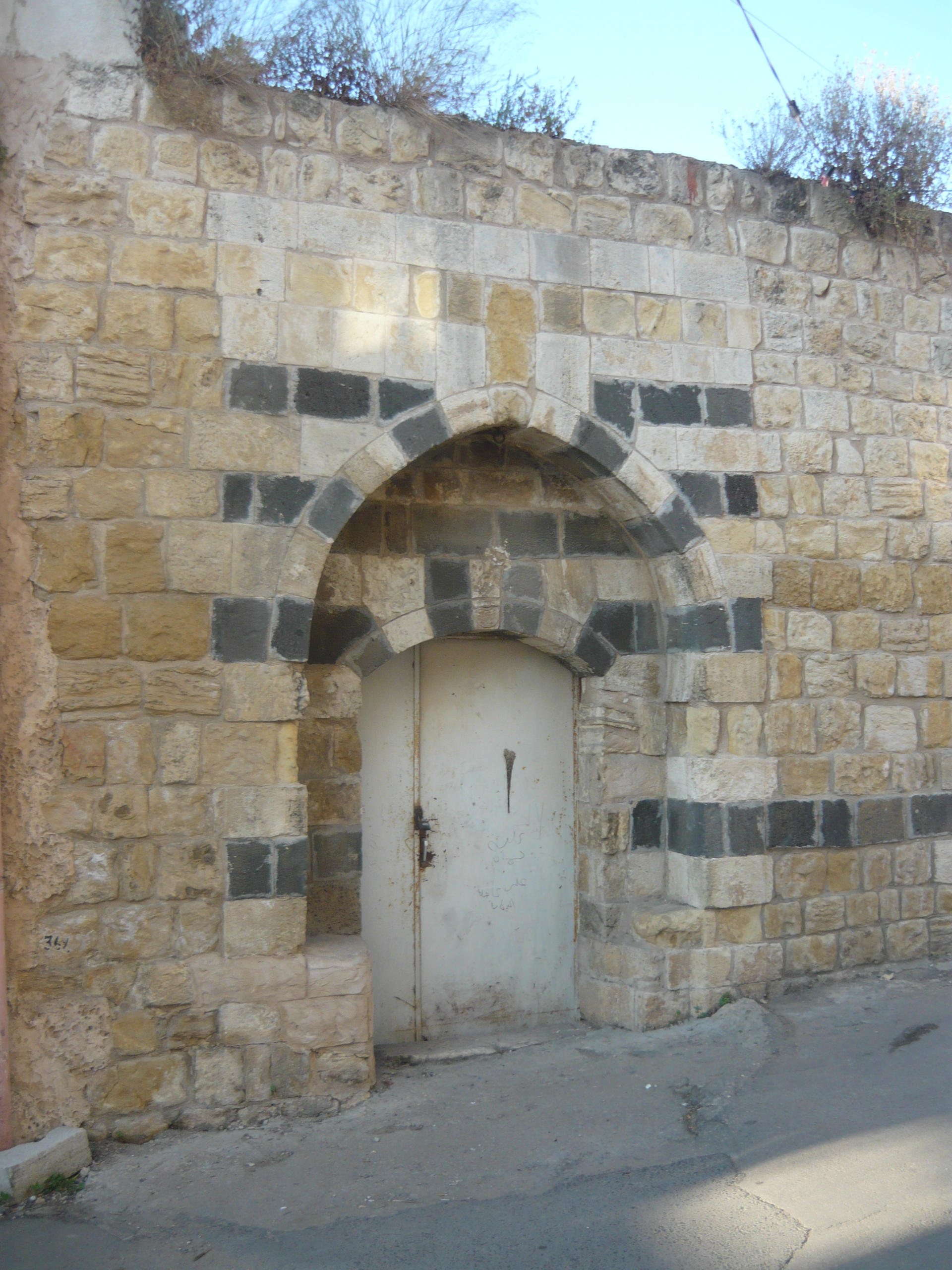|
Margaliot
Margaliot ( he, מַרְגָּלִיּוֹת; ar, هونين) is a moshav in northern Israel. Located along the border with Lebanon in the Upper Galilee, near the town of Kiryat Shmona, it falls under the jurisdiction of Mevo'ot HaHermon Regional Council. In it had a population of , most of them Jews of Iranian Kurdish descent. Name The moshav was named after agronomist , a principal director of the Jewish Colonization Association who was appointed by Baron Edmond de Rothschild to supervise the work of Jewish colonies in Galilee in the early twentieth century. History Background A settlement existed at the site in the Iron Age I (1200-1000 BCE), and again from the Persian period (586-332 BCE) until the latter part of the Byzantine period (5th-6th centuries CE). The Crusader castle of Chastel Neuf (in medieval French) or Castellum Novum (in Latin), lit. "New Castle", was built around 1106-1107 immediately north of the current moshav. Refortified by Mamluk sultan Baibars in ... [...More Info...] [...Related Items...] OR: [Wikipedia] [Google] [Baidu] |
Hunin
Hunin ( ar, هونين) was a Palestinian Arab village in the Galilee Panhandle part of Mandatory Palestine close to the Lebanese border. It was the second largest village in the district of Safed, but was depopulated in 1948.Gelber, 2006, p. 222 The inhabitants of this village were, similar to the inhabitants of Southern Lebanon, Shia Muslims. History Iron Age I to Late Byzantine period The first settlement at the site dates back to Iron Age I (1200-1000 BCE), followed by renewed habitation from the Persian period (586-332 BCE) until the latter part of the Byzantine period (5th-6th centuries CE). Crusader and Mamluk periods The castle named in Frankish chronicles as Chastel Neuf (in medieval French) or Castellum Novum (in Latin), and known as Qal'at Hunin in Arabic, and as (Horvat) Mezudat Hunin in Modern Hebrew, was built in two phases by the Crusaders during the 12th and 13th centuries (1105–7, 1178 and 1240) and refortified by Mamluk sultan Baibars in 1266.Pringle (19 ... [...More Info...] [...Related Items...] OR: [Wikipedia] [Google] [Baidu] |
Mevo'ot HaHermon Regional Council
Mevo'ot HaHermon Regional Council ( he, מועצה אזורית מבואות החרמון, ''Mo'atza Azorit Mevo'ot HaHermon'') is a Regional Council in the Northern District of Israel. It encompasses 13 moshavim and community settlements, from the northern shore of the Sea of Galilee, to the Lebanese border and Mount Hermon. Its offices are located in Merkaz Kach, between roads 90 and 899. Settlements Moshavim * Amnun * Beit Hillel * Dishon * Elifelet *Kahal * Margaliot * Mishmar HaYarden *Ramot Naftali * Sde Eliezer * She'ar Yashuv * Yuval Community settlements * Karkom * Korazim Albanian earthquake relief assistance On 26 November 2019, an earthquake struck the Durrës region of Albania Albania ( ; sq, Shqipëri or ), or , also or . officially the Republic of Albania ( sq, Republika e Shqipërisë), is a country in Southeastern Europe. It is located on the Adriatic The Adriatic Sea () is a body of water separating the ..., killing 51 people, injuring 3, ... [...More Info...] [...Related Items...] OR: [Wikipedia] [Google] [Baidu] |
Latin
Latin (, or , ) is a classical language belonging to the Italic branch of the Indo-European languages. Latin was originally a dialect spoken in the lower Tiber area (then known as Latium) around present-day Rome, but through the power of the Roman Republic it became the dominant language in the Italian region and subsequently throughout the Roman Empire. Even after the fall of Western Rome, Latin remained the common language of international communication, science, scholarship and academia in Europe until well into the 18th century, when other regional vernaculars (including its own descendants, the Romance languages) supplanted it in common academic and political usage, and it eventually became a dead language in the modern linguistic definition. Latin is a highly inflected language, with three distinct genders (masculine, feminine, and neuter), six or seven noun cases (nominative, accusative, genitive, dative, ablative, and vocative), five declensions, four ... [...More Info...] [...Related Items...] OR: [Wikipedia] [Google] [Baidu] |
Neve Hadassah
Neve Hadassah ( he, נְוֵה הֲדַסָּה, ''lit.'' Hadassah Abode) is a youth village in central Israel. Located in the Sharon plain near Netanya and adjacent to Tel Yitzhak, it falls under the jurisdiction of Hof HaSharon Regional Council. In 2006 it had a population of 668. The village was established in 1949 by Tel Yitzhak, Yesodot, Youth Aliyah, and Hadassah. It contains a boarding school and a school catering for pupils from 7th to 12th grade. Over the years, the school has taught immigrants from Latin America, the former Soviet Union and France France (), officially the French Republic ( ), is a country primarily located in Western Europe. It also comprises of overseas regions and territories in the Americas and the Atlantic, Pacific and Indian Oceans. Its metropolitan ar .... {{Authority control Youth villages in Israel Populated places established in 1949 Populated places in Central District (Israel) ... [...More Info...] [...Related Items...] OR: [Wikipedia] [Google] [Baidu] |
2006 Lebanon War
The 2006 Lebanon War, also called the 2006 Israel–Hezbollah War and known in Lebanon as the July War ( ar, حرب تموز, ''Ḥarb Tammūz'') and in Israel as the Second Lebanon War ( he, מלחמת לבנון השנייה, ''Milhemet Levanon HaShniya''), was a 34-day military conflict in Lebanon, Northern Israel and the Golan Heights. The principal parties were Hezbollah paramilitary forces and the Israel Defense Forces (IDF). The conflict started on 12 July 2006, and continued until a United Nations-brokered ceasefire went into effect in the morning on 14 August 2006, though it formally ended on 8 September 2006 when Israel lifted its naval blockade of Lebanon. Due to unprecedented Iranian military support to Hezbollah before and during the war, some consider it the first round of the Iran–Israel proxy conflict, rather than a continuation of the Arab–Israeli conflict. The conflict was precipitated by the 2006 Hezbollah cross-border raid. On 12 July 2006, Hezboll ... [...More Info...] [...Related Items...] OR: [Wikipedia] [Google] [Baidu] |
Iraq
Iraq,; ku, عێراق, translit=Êraq officially the Republic of Iraq, '; ku, کۆماری عێراق, translit=Komarî Êraq is a country in Western Asia. It is bordered by Turkey to Iraq–Turkey border, the north, Iran to Iran–Iraq border, the east, the Persian Gulf and Kuwait to the southeast, Saudi Arabia to the south, Jordan to Iraq–Jordan border, the southwest and Syria to Iraq–Syria border, the west. The Capital city, capital and largest city is Baghdad. Iraq is home to diverse ethnic groups including Iraqi Arabs, Kurds, Iraqi Turkmen, Turkmens, Assyrian people, Assyrians, Armenians in Iraq, Armenians, Yazidis, Mandaeans, Iranians in Iraq, Persians and Shabaks, Shabakis with similarly diverse Geography of Iraq, geography and Wildlife of Iraq, wildlife. The vast majority of the country's 44 million residents are Muslims – the notable other faiths are Christianity in Iraq, Christianity, Yazidism, Mandaeism, Yarsanism and Zoroastrianism. The official langu ... [...More Info...] [...Related Items...] OR: [Wikipedia] [Google] [Baidu] |
Yemen
Yemen (; ar, ٱلْيَمَن, al-Yaman), officially the Republic of Yemen,, ) is a country in Western Asia. It is situated on the southern end of the Arabian Peninsula, and borders Saudi Arabia to the north and Oman to the northeast and shares maritime borders with Eritrea, Djibouti, and Somalia. Yemen is the second-largest Arab sovereign state in the peninsula, occupying , with a coastline stretching about . Its constitutionally stated capital, and largest city, is Sanaa. As of 2021, Yemen has an estimated population of some 30.4 million. In ancient times, Yemen was the home of the Sabaeans, a trading state that included parts of modern-day Ethiopia and Eritrea. Later in 275 AD, the Himyarite Kingdom was influenced by Judaism. Christianity arrived in the fourth century. Islam spread quickly in the seventh century and Yemenite troops were crucial in the early Islamic conquests. Several dynasties emerged in the 9th to 16th centuries, such as the Rasulid dynasty. T ... [...More Info...] [...Related Items...] OR: [Wikipedia] [Google] [Baidu] |
Jewish
Jews ( he, יְהוּדִים, , ) or Jewish people are an ethnoreligious group and nation originating from the Israelites Israelite origins and kingdom: "The first act in the long drama of Jewish history is the age of the Israelites""The people of the Kingdom of Israel and the ethnic and religious group known as the Jewish people that descended from them have been subjected to a number of forced migrations in their history" and Hebrews of historical History of ancient Israel and Judah, Israel and Judah. Jewish ethnicity, nationhood, and religion are strongly interrelated, "Historically, the religious and ethnic dimensions of Jewish identity have been closely interwoven. In fact, so closely bound are they, that the traditional Jewish lexicon hardly distinguishes between the two concepts. Jewish religious practice, by definition, was observed exclusively by the Jewish people, and notions of Jewish peoplehood, nation, and community were suffused with faith in the Jewish God, ... [...More Info...] [...Related Items...] OR: [Wikipedia] [Google] [Baidu] |
1948 War
The 1948 Palestine war was fought in the territory of what had been, at the start of the war, British-ruled Mandatory Palestine. It is known in Israel as the War of Independence ( he, מלחמת העצמאות, ''Milkhemet Ha'Atzma'ut'') and in Arabic as a central component of the Nakba (). It is the first war of the Israeli–Palestinian conflict and the broader Arab–Israeli conflict. During the war, the British terminated the Mandate and withdrew, ending a period of rule which began in 1917, during the First World War. Beforehand, the area had been part of the Ottoman Empire. In May 1948, the State of Israel was established by the Jewish Yishuv, its creation having been declared on the last day of the Mandate. During the war, around 700,000 Palestinian Arabs were displaced.— Benny Morris, 2004''The Birth of the Palestinian Refugee Problem Revisited'' pp. 602–604. Cambridge University Press; . "It is impossible to arrive at a definite persuasive estimate. My predile ... [...More Info...] [...Related Items...] OR: [Wikipedia] [Google] [Baidu] |
Palestinian People
Palestinians ( ar, الفلسطينيون, ; he, פָלַסְטִינִים, ) or Palestinian people ( ar, الشعب الفلسطيني, label=none, ), also referred to as Palestinian Arabs ( ar, الفلسطينيين العرب, label=none, ), are an ethnonational group descending from peoples who have inhabited the region of Palestine over the millennia, and who are today culturally and linguistically Arab. Despite various wars and exoduses, roughly one half of the world's Palestinian population continues to reside in the territory of former British Palestine, now encompassing the West Bank and the Gaza Strip (the Palestinian territories) as well as Israel. In this combined area, , Palestinians constituted 49 percent of all inhabitants, encompassing the entire population of the Gaza Strip (1.865 million), the majority of the population of the West Bank (approximately 2,785,000 versus some 600,000 Israeli settlers, which includes about 200,000 in East Jerusalem ... [...More Info...] [...Related Items...] OR: [Wikipedia] [Google] [Baidu] |
Shiite
Shīʿa Islam or Shīʿīsm is the second-largest branch of Islam. It holds that the Islamic prophet Muhammad designated ʿAlī ibn Abī Ṭālib as his successor (''khalīfa'') and the Imam (spiritual and political leader) after him, most notably at the event of Ghadir Khumm, but was prevented from succeeding Muhammad as the leader of the Muslims as a result of the choice made by some of Muhammad's other companions (''ṣaḥāba'') at Saqifah. This view primarily contrasts with that of Sunnī Islam, whose adherents believe that Muhammad did not appoint a successor before his death and consider Abū Bakr, who was appointed caliph by a group of senior Muslims at Saqifah, to be the first rightful (''rāshidūn'') caliph after Muhammad. Adherents of Shīʿa Islam are called Shīʿa Muslims, Shīʿītes, or simply Shīʿa or Shia. Shīʿa Islam is based on a ''ḥadīth'' report concerning Muhammad's pronouncement at Ghadir Khumm.Esposito, John. "What Everyone Needs to Kn ... [...More Info...] [...Related Items...] OR: [Wikipedia] [Google] [Baidu] |
Zahir Al-Umar
Zahir al-Umar al-Zaydani, alternatively spelled Daher al-Omar or Dahir al-Umar ( ar, ظاهر العمر الزيداني, translit=Ẓāhir al-ʿUmar az-Zaydānī, 1689/90 – 21 or 22 August 1775) was the autonomous Arab ruler of northern Palestine in the mid-18th century, while the region was part of the Ottoman Empire. For much of his reign, starting in the 1730s, his domain mainly consisted of the Galilee, with successive headquarters in Tiberias, Deir Hanna and finally Acre, in 1750. He fortified Acre, and the city became the center of the cotton trade between Palestine and Europe. In the mid-1760s, he reestablished the port town of Haifa nearby. Zahir withstood sieges and assaults by the Ottoman governors of Damascus, who attempted to limit or eliminate his influence. He was often supported in these confrontations by the Shia Muslim clans of Jabal Amil. In 1771, in alliance with Ali Bey al-Kabir of the Egypt Eyalet and with backing from Russia, Zahir captured Sidon, while ... [...More Info...] [...Related Items...] OR: [Wikipedia] [Google] [Baidu] |








